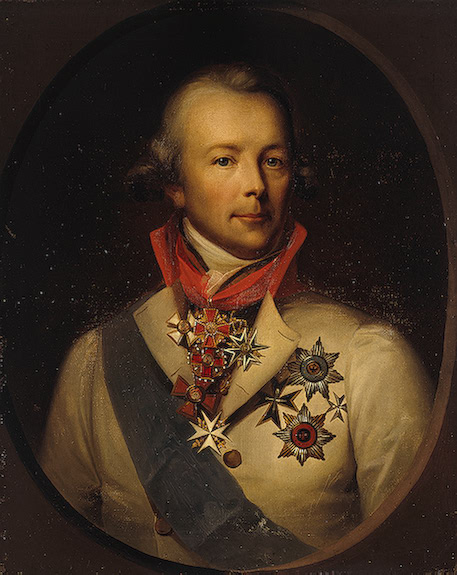
Name: Peter Ludwig von der Pahlen, nicknamed ‘The Professor of Cunning.’
Tagline: played a father and son against each other in a regicidal drama.
Claim to fame: Pahlen is a source of inspiration for weasels everywhere. A combination of duplicity and luck led him nearly unscathed through the murder of Russian Emperor Paul and the accession of Alexander.
Today’s post is a gues post by Cheresse Burke. She’s got a real lucky scoundrel for you, so I’ll let her get on with it:
I’ve been reading The Romanovs by Simon Sebag Montefiore (highly recommendable) and while a lot of the tsars have fascinating stories and crazy personalities, Pahlen’s work as a villain in the accession drama was the one that somehow caught me as the most outrageous tale – or maybe it’s just the fact that he got away with it.
Pahlen was born in modern-day Estonia. He caught the attention of Emperor Paul I during the Russo-Turkish wars and was appointed governor of St Petersburg, but his position was precarious. Paul, son of Catherine the Great, was a paranoid wreck. Catherine had disposed of his father in the typical Romanov way – assassination – and Paul was terrified of being deposed himself. He began a reign of terror to protect himself, exiling people left and right, but his greatest fear turned into a self-fulfilling prophecy with Pahlen at the helm.
Pahlen had been fired twice for his connections to courtiers unfavorable to Paul, but he’d always managed to worm his way back into the Emperor’s good graces. He began plotting to replace Paul with Alexander. Alexander had his own reasons to be nervous: the Romanovs had a precedent for killing uppity heirs. Alexander was unwilling to commit to Pahlen, clever enough to avoid something concrete that his paranoid father might get his hands on. But when Paul tightened the (sometimes literal) noose, Alexander gained allies and the plot grew. So far, fairly normal for a conspiracy against the throne. But here’s where it gets fun. Pahlen betrayed Alexander to Paul, informing the Emperor of his son’s co-conspirators and their intentions – then, as Paul ruminated on the proper counter measures, Pahlen went back to Alexander and reported that Paul intended to destroy him. This gained support for Alexander. When the officers at court heard of the plot, over two hundred moved for Alexander. Paul was really not a popular guy.
Paul moved into a fortress, complete with moat and drawbridges. Anyone going in or out had to know the passwords – which Pahlen knew as a trusted snitch. Pahlen moved to exile his enemies and gather yet more power, eventually becoming postmaster with the power to open mail. But this appointment put him in peril as well. Once, when Pahlen was carrying a message amongst his other letters, Paul spied the bundle of papers in his pocket and demanded to see them. Pahlen narrowly avoided handing over evidence of his own treason. At another point Pahlen carried only two letters in his pocket – Paul’s order of the day, and a list of conspirators he had drawn up himself. Paul demanded the order of the day, and Pahlen gambled his life on a 50-50 chance, reaching into his pocket. He brought out Paul’s orders and yet again saved his own neck.
Eventually, a list of conspirators found its way into Paul’s hands. He called Pahlen before him and asked him about it. Pahlen’s reply? “I know it and I am in the plot.” He assured Paul that he controlled the whole thing, and that Paul was perfectly safe. Then he ran to Alexander and reported everything.
When it finally came time to get rid of Paul, Pahlen arranged the whole thing. The Emperor was awoken from his bed when twelve soldiers, drunk on wine and nerves, burst into his bedchamber on a pretence and forced him to abdicate. In the ensuing scuffle, Paul was strangled. Pahlen arrived “conveniently late,” ready to arrest the plotters in case the coup failed and retain his good graces with the Emperor – whoever that was now.
Pahlen went into exile shortly after Paul was murdered; Alexander despised himself for his part in the coup, and he despised Pahlen for his weaselly ways. But he managed to keep his head, and that’s saying something.
How I would use him: Pahlen would make a great classic court villain, mostly because he was clever enough to run a double-bluff. Maybe an historical Vampire game could feature Pahlen, or you could try some twisty-turny court game about organizing a coup behind your emperor’s back.